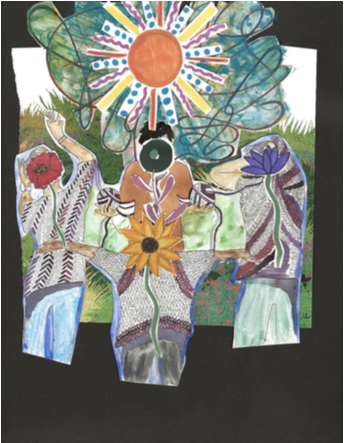
Elevate!
Solidarity is intersectional.
Cooperation Denton is inspired and informed by both the Kurdish Women’s Movement and Intersectional Theory in the States. We adopt actions by both to inform our personal day to day lives as well as the way Cooperation Denton operates. We always look to challenge ourselves, each other and our communities to live up to and beyond the aspirations of both movements.
The Kurdish Women’s Movement has enriched our perspective with their paradigm of Democratic Confederalism, which unlike the vast majority of transformative ideologies has the freedom of women at its very heart. Most revolutionary ideologies since the 19th century have paid lip service to women’s freedom, and some have even spurred incredible movements that have scored many gains for women, but still the vast majority put women’s issues as issues that could best be handled after some glorious revolution. Democratic Confederalism, as laid out by imprisoned Kurdish theorist Abdullah Ocalan, asserts that the freedom of women must be the very starting point of where we begin to free society and humanity because all forms of domination and oppression can be first traced back to the organized subjugation of women around 5000 years ago. The Kurdish movement says that “freedom must be found where it was first lost” and since “women were the first colony”, society cannot be free until women are free. And since this subjugation occurred through ideological control, the suppression of women’s autonomous economic capacity, and outright force, our search for freedom employs a new ideology of intersectional feminism, women’s cooperatives and other women-led solidarity economy projects, and women’s self-defense to reverse this.
Cooperation Denton has so much to learn from the Democratic Confederalist revolution in North and East Syria that serves as the brightest beacon in the global fight for women’s liberation. We have modified adopted their practices of having co-chairs (in which two people chair any committee, delegate position, or other position of influence, at least one of whom is not a man), gender quotas, self-organizing and autonomous councils for women (which always and specifically include trans women) and non-binary people, transformative, non-punitive forms of justice and peacemaking, and women’s self-defense organizations. We are imperfect people engaging everyday in a struggle to kill and transform the dominant male mentality inside of all of our heads, while embracing an alternative model of masculinity that embodies the values that the leading feminist theorist bell hooks (she intentionally wrote her name in lower-case) wrote about in her masterpiece The Will To Change. The masculinity is based on “integrity, self-love, emotional awareness, assertiveness, relational skill including the capacity to be empathetic and strong, autonomous and connected, responsible to self, to family and friends, and to society” instead of the dominant male mentality which dominates and hurts people of all genders, including men. Kurdish revolutionaries have another mantra that we have found true to our own lives: “only 5% of your energy should be spent fighting the system and the other 95% on fighting the system inside of yourself”. The dominant male has been passed on from the dominant culture into all of our mindsets whether we want it there or not, so we practice a form of loving and constructive criticism and self-criticism with each other to try to root these harmful tendencies out.
As we learn from our friends abroad, we also learn from friends closer to home, and have constructive debates together to strengthen our own perspectives. The INTERSECTIONAL word in our pillar comes out of black feminists in the United States who recognized that various forms of inequality work together and make each other worse, compounding and deepening traps that limit everyone from being free. This analysis crucially responded to the unique layers of oppression faced by many ethnic groups in this country, women, and especially LGBTQIA+ communities, and the ways in which the attacks by the system on these marginalized groups almost always overlapped. It also recognizes that our shared struggles, the empowerment of all people through self-organization from many different backgrounds, ideas, and cultures can compound and deepen what freedom looks like. When these perspectives come together, we come closer to laying the groundwork for dual power. DUAL POWER is the power that society has the capacity to cultivate parallel to (and when appropriate, in opposition to) existing institutions of power like the state or the market. When we approach each other in a way that understands the way that diverse searches for freedom can bolster each other, we can create an alternative web of neighbor-powered, bottom-up infrastructure that becomes the main source of meeting our needs and desires, replacing the old sources and rendering them obsolete.